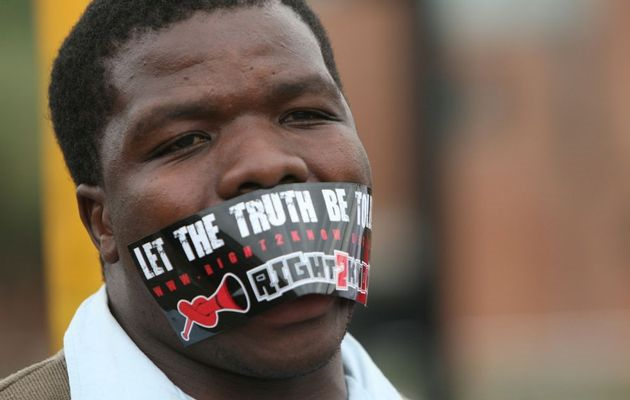Right2Know wants National Key Points revealed
This article below was published by TimesLIVE:
Sapa | 23 November, 2014 13:40

Right2Know protester. File photo.
Image by: ANTONIO MUCHAVE
The Right2Know Campaign (R2K) and the SA History Archive (SAHA) will on Monday argue for the police to reveal South Africa’s National Key Points in the High Court in Johannesburg.
“We believe this basic transparency is an important step in countering the uncontrolled secrecy and potential abuse of South Africa’s ‘national security’ policies,” R2K spokesman Murray Hunter said in a statement.
The organisations wanted the list of National Key Points in terms of the Promotion of Access to Information Act (PAIA).
National Key Points are protected from being photographed or identified as a key point and are understood to include military installations and services or factories considered strategic.
In 2012 a request was made to the SA Police Service for the list of key points, but it was refused.
“An internal appeal to the Minister of Police upheld that refusal; in addition to broad security concerns, the Minister cited the need to consider the privacy of private companies who are protected by the Act.”
Hunter said civic organisations had complained that the secrecy surrounding National Key Points had been “used to undermine” the right to know and to protest in public spaces.
“The Act has been infamously invoked to justify the controversial R230-million upgrades to President Jacob Zuma’s personal home in Nkandla, and to hamper efforts to bring the scandal to light.”
The PAIA sets out a number of grounds for the refusal to grant access to information.
These include defence, security and international relations of South Africa, its economic interests and financial welfare, and protection of commercial information of a third party, such as trade secrets and commercial information.
However, the PAIA also provided for records to be disclosed in the public interest, even where legitimate reasons to refuse access existed, provided they contained information the public had a clear right to know, Hunter said.
“Though the list of National Key Points remains a secret, the number of sites appears to have increased by nearly 70 percent in the past seven years.”
In May last year the police ministry said the National Key Points Act was being reviewed, but no amendment Bill had yet materialised.
“Importantly, SAPS has made it clear that they do not intend to table a public list of National Key Points and Strategic Installations as part of a Parliamentary amendment Bill, meaning Parliament should produce a law with no public list of the institutions and places which would be affected by the law.
“We maintain that the blanket secrecy over which sites have been declared National Key Points has helped officials and politicians to use and abuse the Act to undermine our constitutional rights,” Hunter said.


